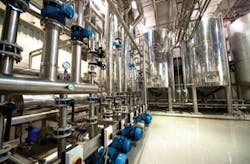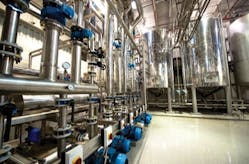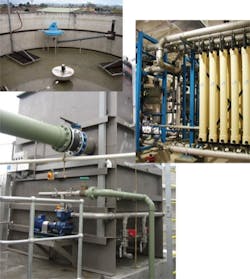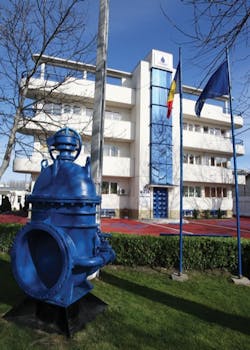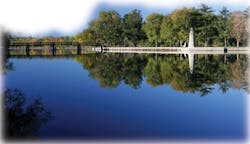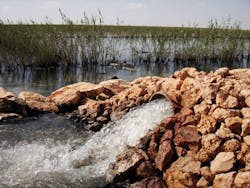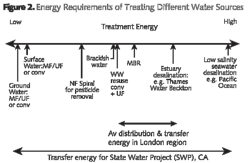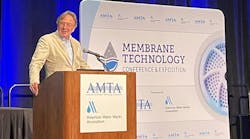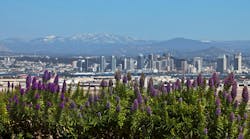Romania is facing Water Framework Directive challenges and two thirds of the rural population still lack access to a centralised water supply system. Dr Vasile Ciomos, president of the country's water association speaks to Jeremy Josephs about opportunities for international water companies and improving non-revenue water.
The rigorous requirements of the European Water Framework Directive (WFD) might well look fine on paper. But when it comes to the issue of their implementation in Romania, Dr Vasile Ciomos is quick to inform you that it's by no means an easy task. Quite the contrary, in fact. With the clock ticking against his country to comply with EU directives in terms of environmental protection by 2015, Dr Ciomos - who heads up the Romanian Water Association (RWA) - prefers to speak of 'challenges and opportunities' rather than deadlines and defaults, despite being perfectly well aware that his country is running late. This prompts one to suggest that the issue of water sector compliance must surely be at the very top of his agenda.
"You bet," he says. "It's my number one priority. The regulated operators which my organisation represents are charged to comply with EU regulations. Of course its the central government which enters into agreements with the EU – but the 40 members of the association need no reminding of their critical role when it comes to the issue of compliance. This means that huge investment works still have to be carried out in the water sector because both sewerage and water infrastructure remain very low here."
Meeting WFD criteria
Tick, tick, tick - the WFD evidently waits for no man - Romanian or otherwise and it would be something of an understatement to say that Ciomos is a man in a hurry. He admits that Romania is behind schedule but takes comfort from the fact that the EU's reporting system is more flexible, especially when Brussels can see that a sustained and genuine effort is being undertaken in Bucharest and rolled out nationally.
Still, it is not in Ciomos's nature to cry over spilled milk and he quickly concurs with the notion that in ordinary circumstances no useful purpose is served through revisiting the past. "Allow me just to say this, though - the agenda and requirements which were worked out together by the EU and Romania were reasonable enough for 2003 and 2004," he says. "This was a good time for Romania economically, a period when we had growth. We were optimistic that we would be able to invest. But then came the global economic crisis and some EU requirements, to be perfectly frank, came to be too onerous. That's what's behind our ongoing battle in relation to dates and compliance."
The RWA was formally established in 2000 – water operators propelled into action through the need to establish a united front in relation to transition. There was a huge process of decentralisation taking place at that time – an understandable reaction, no doubt, to a country freeing itself from the shackles of communist economic theory and practice – but Romania's water operators realised right away that they nevertheless required a single and coherent strategic body to interface with government. Ciomos was involved with the RWA from the outset and has headed it up for the last eight years. Its self-appointed brief? Modernisation and reform.
"We work closely with government, of course, especially in terms of assessment and evaluation strategies of the sector," he says. "But that doesn't always mean that we see eye to eye. For example we have been advocates of the case for regionalising water operators more – in order to take advantage of economies of scale. I would characterise our relationship with the government as close - but not cosy."
In practical terms this means dealing with the Ministry of the Environment and the Ministry of Public Administration on an almost daily basis in addition to regular contact with regional and local authorities too. It provides sufficient work for 15 full time staff.
Foreign investment
Looming EU deadlines might well be bad news for Ciomos and the RWA but they represent good news in terms of major investment opportunities for foreign investors. But do these two strands pull in opposite and competing directions or is this something Ciomos welcomes? His answer could hardly be more clear-cut - there is room for everyone when it comes to the huge level of investment still required in Romania.
"Of course the hard construction works will be carried out by Romanian entrepreneurs but it is clear that equipment and state of the art technology will have to come from abroad – from Germany, France, Holland, America and the UK. In fact they are already well established in the Romanian market and their presence is something I welcome.
"We go out of our way each year, in June, at the Expo Apa in Bucharest to attract suppliers, consultants and researchers from abroad because this brings people to assess market demands and establish contractual relationships with operators."
It is not difficult to see why the major international water players are eager to enter an appearance at the annual Expo Apa Water Forum: Romania remains a country affected by absent or insufficient infrastructure - two thirds of the rural population (almost seven million people) do not have access to a centralised water supply system at all.
Of course when it comes to Romania's great urban areas – the cities of Bucharest, Iasi, Cluj-Napoca, Timisoara and Constanta - the figures are much better. But even there they only rise to a little over 90%. Modernisation and rehabilitation opportunities abound.
He goes onto say: "I wholly reject the notion that this is economic colonialism in any way shape or form. That said we have to watch our step as we go – of course we do. But there is no getting away from the fact that we need such expertise. Plus I think it's fair to say that our own water operators are becoming better prepared to maintain a balanced relationship with these foreign companies."
The rallying cry of the RWA can be summed up in one word - investment. Potential investors should bear in mind, though, that in Romania the water operators are directly related to local and regional authorities. They might well be run along private lines, but they remain fully controlled by local and regional authorities who also own them.
In other words reforms have seen to it that the utilities have been both corporatised and commercialised – but they nevertheless remain firmly in public hands. There has not been – and never will be – a great state sell-off, as seen with Margaret Thatcher in the UK and privatisation plans. Although that has not, of course, excluded public private partnerships from emerging at a fast and furious pace.
Tariffs and non-revenue water
Push Ciomos a little and he will admit to you that there is a delicate balance to be struck. Of course financing water infrastructure is carried out via various channels, including assistance from Brussels, to help implement Romania's top priorities. But Romanian cannot live by Brussels alone. Which is why, at the same time, RWA members have sought to increase tariffs in the water sector quite significantly while at the same time doing their utmost to keep them affordable.
A cost benefit analysis recently carried out by the RWA in relation to affordability revealed that there is little chance of implementing the much-vaunted cost recovery principle, at least in the short-term. It is as well, therefore, that the majority of the population pay their water tariffs - which usually run at between 2.5 to 3.5% of a household's income. During the last 10 years the tariff collection ratio has improved steadily.
An additional complicating factor in Romania is the scale of non-revenue water: losses through leakages, illegal connections and commercial losses are quite high and Ciomos admits that this is a major problem.
"As in other Eastern European countries, in Romania its running at between 40% and 60% which is huge. All I can say is that a great deal of effort is being put in on the part of our members to decrease this level.
"It's a bit of a viscous circle though because we are hampered by an absence of proper investment and also because in relative terms consumption levels have decreased from 300 litres per capita per day to 120."
Downstream to upstream: Danube management
There are other factors are at work too – there is now metering of around 90% of water services to the population, prices have gone up and environmental awareness campaigns are, slowly but surely, beginning to have an impact.
It is impossible to consider the case of Romania without taking note of the fact that almost the whole of the country falls within the Danube River Basin. Over a third of the river's length flows through Romania – the Danube the only river on earth which flows through 10 countries. The Danube River Protection convention might well have been signed back in 1994 but it proved to be particularly ineffective. Small wonder, therefore, that the status of the Danube looms large in Ciomos's life, although his freedom of manoeuvre is somewhat limited by the fact that the river is very dependent on pollutant inputs from upstream countries.
"Yes, this is a big problem for us," he admits, "but let's be honest about this – we are an important polluter of the Danube downstream too. This is why we set up the Danube River Management Plan in 2009 which was approved by the EU Commission in March of last year."
In practical terms this has meant that RWA members have had to build a number of wastewater treatment plants on the Danube side because there remain significant population areas without any facilities at all. And what is true for the Danube is true for Romanian water resources as a whole – that it is a victim of the past – shackled by the severe levels of water pollution built up before it acceded to the EU in 2007.
Today over half of Romania's water bodies show high ecological status, true, but water quality in much of the rest of the country remains significantly and adversely affected by the ill-considered developments of the 60s, 70s and 80s. Political ideologies may well come and go – ecological systems clearly take considerably longer to recover.
Attracting investment
It would be wholly accurate to affirm that bringing Romania's water infrastructure up to EU standards and requirements is a daunting task. It is not a contention with which Ciomos would seek to take issue.
"Sometimes I am not so optimistic that we will be able to fulfil all of these new challenges. Certainly the timescale is very tight. But we have no option other than to remain upbeat and positive. We want to do this through hard work and a relentless advance forwards. You have been kind enough to give me a platform in this interview and I would like to use it to arouse the interest of investors in Romania."
He goes onto say: "This would, in turn, mean that we would be able to group together the necessary resources to be able to comply with all of the EU requirements."
Ciomos points out that he has not spent the entirety of his career in water. His academic background is in economics – the subject of his PhD on the management of municipal services in Romania. But employment as general director in a multi disciplinary utilities firm saw him make the transition from economics towards the world of the technical. He would have you believe that he now very much enjoys the scientific aspects of the world of water. He then saw life from the bureaucrats' perspective, working for the Ministry of Public Works in Bucharest for some time.
Back on the subject of investment, he adds: "I want to encourage investors to come forward. But we also require know-how transfer, in addition to a friendly environment in this part of the world. We need partners, yes. We need stability, too. In other words it's not just all about money. These various factors are all inter-connected and inter-linked. This makes the situation in Romania both challenging and complex. Am I up for the challenge though? For sure."
More Water & WasteWater International Current Issue Articles
More Water & WasteWater International Archives Issue Articles
